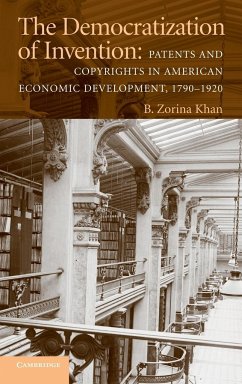This book, first published in 2005, examines the evolution and impact of American intellectual property rights during the 'long nineteenth century'. The American experience is compared to Britain and France, countries whose institutions reflected their oligarchic origins. Instead, US patent and copyright institutions were carefully calibrated to 'promote the general welfare'. The United States created the first modern patent system and its politics were the most liberal in the world toward inventors. When markets expanded, these inventors contributed to the proliferation of new technologies and improvements, many of which proved to be valuable both in economic and technical terms. American patent and copyright institutions not only furthered economic and technological progress but also provided a conduit for the creativity and achievements of disadvantaged groups.
Hinweis: Dieser Artikel kann nur an eine deutsche Lieferadresse ausgeliefert werden.
Hinweis: Dieser Artikel kann nur an eine deutsche Lieferadresse ausgeliefert werden.
"Given the widespread appeal to history in modern judicial opinions, academic articles, and public policy debates, such empirical work is important. Historians and economists may dispute some of her methods or conclusions, but such debates about the historical facts will be a welcome change to the ascendancy of rhetoric on such subjects. Khan's work is an important contribution to our discourse about American patent law and its historical development." - Adam Mossoff, Michigan State University








